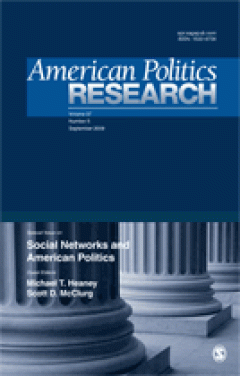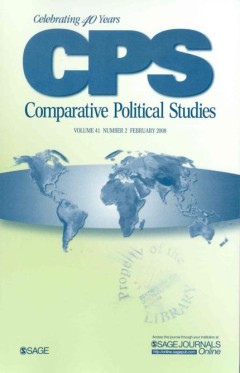Filter by

Gender Stereotypes and Attitudes Toward Gender Balance in Government
The desire to elect more women to public office is likely to affect a range of political behaviors and may explain the relatively low levels of women's descriptive representation overall. Yet, little is known about the public's view of the ideal gender composition of government. We find that the public expresses a preference for higher levels of women's representation than the country has exper…
- Edition
- Volume 37, Number 3, May 2009. pp. 409-428
- ISBN/ISSN
- 1532-673x
- Collation
- -
- Series Title
- American Politics Research
- Call Number
- -

Put to the Test: Understanding Differences in Support for High-Stakes Testing
Despite the importance of high-stakes tests in education policy, relatively little is known about opinion on this issue. We examine racial and socioeconomic differences in support for high-stakes testing. Given the achievement gaps between racial minorities and Whites and between the lower and higher status, it would be reasonable to expect that those whose children are most likely to do well o…
- Edition
- Volume 37, Number 3, May 2009. pp. 429-448
- ISBN/ISSN
- 1532-673x
- Collation
- -
- Series Title
- American Politics Research
- Call Number
- -

Departures From the Court: The Political Landscape and Institutional Constraints
Previous findings on whether U.S. Supreme Court justices include strategic factors in their decisions to leave the Court have been mixed. We use ideological distance measures to capture the political landscape and retest the hypothesis that justices use strategic political considerations when making the decision to leave the Court. Using a Cox model of proportional hazards, we find that justice…
- Edition
- Volume 37, Number 3, May 2009. pp. 486-507
- ISBN/ISSN
- 1532-673x
- Collation
- -
- Series Title
- American Politics Research
- Call Number
- -

Partisan Strength and Nonpartisanship Among Asian Americans
Relatively little is known about partisan identification among immigrant-dominated ethnic groups in the United States. In this article we build on the work of Lien, Conway, and Wong (2004) to explore patterns of partisan strength and nonpartisanship among Asian Americans. We note that more than one third of Asian Americans do not identify themselves on the standard seven-point partisan identifi…
- Edition
- Volume 37, Number 3, May 2009. pp. 375-408
- ISBN/ISSN
- 1532673x
- Collation
- -
- Series Title
- American Politics Research
- Call Number
- -

The Role of Candidate Choice in the California Recall Election
Many have argued that the reelection and later recall of Governor Gray Davis in California serves as a perfect example of how primaries draw politics to the extremes by nominating candidates too liberal or conservative for the general electorate. Davis defeated a conservative Republican opponent in his reelection campaign, only to lose in the recall just one year later when there were no primar…
- Edition
- Volume 37, Number 3, May 2009. pp. 465-485
- ISBN/ISSN
- -
- Collation
- -
- Series Title
- American Politics Research
- Call Number
- -

Bad for Business?: Entrepreneurs and Democracy in the Arab World
Why do business communities in some developing countries support democratization whereas business communities in other developing countries continue to support authoritarian rule? In an effort to answer this question, the author compares the political behavior of entrepreneurs in one region where entrepreneurs have supported democratization, Latin America, with a region where entrepreneurs have…
- Edition
- Vol. 41, No. 6, June 2008. Page 837-860
- ISBN/ISSN
- 0010-4140
- Collation
- -
- Series Title
- Comparative Political Studies
- Call Number
- -

The Mass Media's Political Agenda-Setting Power: A Longitudinal Analysis of M…
Do mass media determine or codetermine the political agenda? Available answers on this question are mixed and contradictory. Results vary in terms of the type of political agenda under scrutiny, the kind of media taken into account, and the type of issues covered. This article enhances knowledge of the media's political agenda-setting power by addressing each of these topics, drawing on extensi…
- Edition
- Vol. 41, No. 6, Page 814-836
- ISBN/ISSN
- 0010-4140
- Collation
- -
- Series Title
- Comparative Political Studies
- Call Number
- -

Globalization, Veto Players, and Welfare Spending
This article examines the role of globalization and its interaction with domestic political institutions (veto players) in shaping welfare spending in 18 advanced industrial countries from 1960 to 2000. First, the author evaluates how integrated world markets have influenced welfare expenditures. Results suggest that globalization increased welfare spending in this sample. Second, the author st…
- Edition
- Vol. 41, No. 6, Page 783-813
- ISBN/ISSN
- 0010-4140
- Collation
- -
- Series Title
- Comparative Political Studies
- Call Number
- -

Veni, Vidi, Disseri: Churches and the Promise of Democratic Deliberation
As the most popular voluntary association in the United States, churches are sometimes touted as saviors of democracy. However, those who espouse deliberative models of democracy rarely see churches as nurturing the decision-making abilities of attenders. Thus, the authors examine the extent to which church small group sessions fulfill the conditions for deliberation as set forth by political t…
- Edition
- Vol. 37 no. 4 July 2009 pp. 614-643
- ISBN/ISSN
- 1532673x
- Collation
- -
- Series Title
- American Politics Research
- Call Number
- -

Initiated Distrust: Direct Democracy and Trust in Government
An abundance of recent research has suggested that direct democracy institutions, such as the initiative and referendum, craft an environment ripe for encouraging better democratic citizenship. High and frequent exposure to ballot measures has been shown to increase the awareness, efficacy, political participation, and even the general level of happiness of citizens. In contrast to these studie…
- Edition
- Vol. 37 no. 4 July 2009 pp. 539-568
- ISBN/ISSN
- 1532673x
- Collation
- -
- Series Title
- American Politics Research
- Call Number
- -

Comparing Predictors of Women's Congressional Election Success: Candidates, P…
Examining all Congressional races from 1992 through 2000, we explore why, over time, some districts are more likely to have women candidates and to elect women than are others. We focus on the obvious, but rarely explored, fact that women's election success is a product of three key stages of the election process: women running, women's successes in the primaries, and finally, women's general e…
- Edition
- Vol. 37 no. 4 July 2009 pp. 593-613
- ISBN/ISSN
- 1532673x
- Collation
- -
- Series Title
- American Politics Research
- Call Number
- -

The Presidency, Regionalism, and Distributive Politics in South Korea
Although whether there is political influence on distributive policies is now indisputable, important debates have emerged about how politics distorts distributive policy outcomes. In this article, the authors improve the understanding of distributive politics by focusing on South Korea. They argue that because of Korea-specific institutional and cultural settings, an incumbent president …
- Edition
- Vol. 41, No. 6, Page 861-882
- ISBN/ISSN
- 00104140
- Collation
- -
- Series Title
- Comparative Political Studies
- Call Number
- -

A Bayesian Prediction Model for the U.S. Presidential Election
- Edition
- Vol. 37 no. 4 July 2009 pp. 700-724
- ISBN/ISSN
- 1532673x
- Collation
- -
- Series Title
- American Politics Research
- Call Number
- -
- Edition
- Vol. 37 no. 4 July 2009 pp. 700-724
- ISBN/ISSN
- 1532673x
- Collation
- -
- Series Title
- American Politics Research
- Call Number
- -

Counteractive Lobbying in the U.S. Supreme Court
Theories of counteractive lobbying assert that interest groups lobby for the purpose of neutralizing the advocacy efforts of their opponents. We examine the applicability of counteractive lobbying to explain interest group amicus curiae participation in the U.S. Supreme Court's decisions on the merits. Testing the counteractive lobbying hypotheses from 1953 to 2001, we provide strong support fo…
- Edition
- Vol. 37 no. 4 July 2009 pp. 670-699
- ISBN/ISSN
- 1532673x
- Collation
- -
- Series Title
- American Politics Research
- Call Number
- -

Racial Context Effects and the Political Participation of Asian Americans
In 1948, V. O. Key demonstrated how racial context influences political attitudes and behavior in the South. In more recent studies, racial linked fate and racial discrimination have been identified as powerful predictors of minority political behavior. What remains unexplored in the literature is whether race-based predictors such as these vary as a direct function of racial context and, as a …
- Edition
- Vol. 37 no. 4 July 2009 pp. 569-592
- ISBN/ISSN
- 1532673x
- Collation
- -
- Series Title
- American Politics Research
- Call Number
- -

Voter Rolloff in a Low-Information Context: Evidence From Intermediate Appell…
Hall notes that ballot rolloff in supreme court races is substantial but not random. Various institutional, election-specific, state, and district-level contextual forces lead rolloff to increase in some cases and decrease in others. However, it is not clear that Hall's findings apply to lower-level judicial elections because of the low-information environment in which those elections occur. An…
- Edition
- Vol. 37 no. 4 July 2009 pp. 644-669
- ISBN/ISSN
- 1532673x
- Collation
- -
- Series Title
- American Politics Research
- Call Number
- -

Civic Talk and Civic Participation: The Moderating Effect of Individual Predi…
Individuals who discuss politics and current events in their social network also participate in civic activities. However, analytical biases make it difficult to show a causal relationship between these two phenomena. To obtain a more accurate measurement of the effect that civic talk has on civic participation, data were collected through a panel study conducted on students who were randomly a…
- Edition
- Vol. 37 no. 5 September 2009 pp. 856-878
- ISBN/ISSN
- 1532673x
- Collation
- -
- Series Title
- American Politics Research
- Call Number
- -

Governing U.S. Metropolitan Areas: Self-Organizing and Multiplex Service Netw…
How are fragmented metropolitan areas characterized by multiple actors and multiple relationships governed? This has been a question of enduring interest in the study of local politics and policy. Recent works have made progress in understanding the emergence of self-organizing networks for individual service relationships. However, in the context of multiple service relationships, patterns of …
- Edition
- Vol. 37 no. 5 September 2009 pp. 801-823
- ISBN/ISSN
- 1532673x
- Collation
- -
- Series Title
- American Politics Research
- Call Number
- -

Party Coalitions and Interest Group Networks
We analyze affiliation networks of interest groups that endorse the same candidates in primary elections, donate to the same candidates in general elections, and voice support for the same legislative proposals. Patterns of interest group ties resemble two competing party coalitions in elections but not in legislative debate. Campaign endorsement and financial contribution ties among interest g…
- Edition
- Vol. 37 no. 5 September 2009 pp. 767-800
- ISBN/ISSN
- 1532673x
- Collation
- -
- Series Title
- American Politics Research
- Call Number
- -

The Implications of Class, Race, and Ethnicity for Political Networks
Previous research demonstrates the importance of citizens� communication networks as an influence on their political behavior. Yet most findings are limited to samples of Whites or the interaction of Whites with their discussants. This article extends our attention to the social networks of Blacks, Latinos, Asians, and noncitizens, and explores how communication processes differ across them. Us…
- Edition
- Vol. 37 no. 5 September 2009 pp. 824-855
- ISBN/ISSN
- 1532673x
- Collation
- -
- Series Title
- American Politics Research
- Call Number
- -
 Computer Science, Information & General Works
Computer Science, Information & General Works  Philosophy & Psychology
Philosophy & Psychology  Religion
Religion  Social Sciences
Social Sciences  Language
Language  Pure Science
Pure Science  Applied Sciences
Applied Sciences  Art & Recreation
Art & Recreation  Literature
Literature  History & Geography
History & Geography